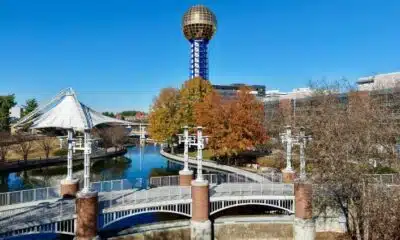News from the South - North Carolina News Feed
Police sniper at Black Mountain Christmas parade? Can downed trees on public lands be turned into usable lumber? • Asheville Watchdog
Today’s round of questions, my smart-aleck replies, and the real answers:
Question: (John Boyle here, not a questioner). This topic comes from a Facebook post on the Original Black Mountain Exchange in which a person who attended the Black Mountain Christmas Parade on Saturday was unsettled by the presence of what appeared to be a sniper atop a building along the route. Another man with a pair of binoculars was also on the rooftop, and neither appeared to be in police uniforms. The post, and another on an individual’s Facebook page, generated almost 500 comments, with several people asking for an explanation from the Black Mountain Police Department. The gist of the commentary was: Why was this done? Were these men police officers? Is this necessary? Why was there no notice that this was going to take place? And, is this really the world we live in now? Honestly, I was curious myself, and folks were asking for answers, so I reached out to the Black Mountain Police Department.
My answer: Sadly, I think we all know the answer to the question, “Is this really the world we live in now?”
Real answer: Black Mountain Police Chief Chief Steve Parker told me Monday that the men on the roof were police officers with the department, including the man with the sniper rifle.
“He’s been there for the last three years,” Parker said. “We’ve had somebody ever since Waukesha, Wisconsin, and the Christmas parade that 60 people got mowed down. (After that) we started making sure that we had an overwatch, just making sure that we can protect everybody.”
Parker was referring to the Christmas parade in Waukesha, Wisconsin, in which a man drove an SUV into the parade in 2021, killing six and injuring dozens more. As NPR reported in 2022, the attacker was sentenced to life in prison. He had gotten into a fight with his ex-girlfriend before the incident, and he had struggled previously with mental illness.
The Black Mountain officers did wear clothing that identified them as officers and part of the overwatch, Parker said, referring to a police term that refers to setting up a security perimeter at a public event.
Parker acknowledged that the officers’ appearance, especially with the clearly visible rifle, may have been upsetting to some attendees.
“It doesn’t always look pretty, but (we’re) just making sure that we’re doing our due diligence for public safety,” Parker said, noting the department provided similar security for the recent visit of first lady Jill Biden, assisting Asheville with the overwatch. “It’s kind of a common practice.”
The team on the roof consisted of an officer to man the rifle and a spotter with a pair of binoculars. The officers were “a little more overt” this year than last, Parker said.
“It’s kind of like insurance. We’d hope we never use it, right?” Parker said. “We hope we will never have to have it, but at the end of the day, we have got to make sure that we are ensuring that the public is safe if there is somebody who wants to take a car through the crowd or there is an active shooter. And that’s just kind of the world we live in.”
Smaller towns can be tempting targets because potential attackers may think security is more lax, Parker said.
As far as letting the public know in advance, Parker said that can cut both ways, because it could alert someone with bad intent about where the most security is. Letting the public know in advance could calm some fears, but that comes with possibly losing some of the security advantage, he said.
Similar problems arise with having the officers in full uniform or wearing a bright vest that states, “Police.” The parade started late in the afternoon, and as the sun set, a man dressed in a black police uniform could also have scared attendees, Parker noted.
Some on social media suggested the police should concentrate on security on the ground. Parker said they staff the parade with 30 to 35 police and reserve officers, with officers on the sidewalks and streets.

Question: Why doesn’t the city or county sell the fallen trees from Tropical Storm Helene to lumber companies? Couldn’t the county use the money to help with rebuilding/disaster relief? Same with the national parks. The amount of trees up at Rattlesnake trailhead alone has got to be worth a ton. Tons of oaks, cedars, and ash that could be recycled into lumber for homes, furniture, etc. Seems wasteful and a missed opportunity.
My answer: If ever there was a time when North Carolina could re-energize its furniture manufacturing heritage, this is it.
Real answer: As we reported in November, Tropical Storm Helene downed or damaged about 40 percent of trees in Buncombe County.
“The U.S. Forest Service is exploring the possibility (of) salvaging downed timber on the Pisgah National Forest left in the wake of Tropical Storm Helene to help remove road and trail blockages, reduce potential fuels for wildfires and improve overall public safety,” Forest Service spokesperson Adam Rondeau said via email. “Our focus right now, however, continues to be on clearing access throughout the forest and assessing damage to roads, bridges, and trails.”

Rondeau said Helene damaged several thousand acres of Pisgah National Forest, “leaving a significant amount of woody debris and downed trees in the aftermath and creating higher-than-usual levels of fuel for wildfires.”
“To help mitigate this risk, the U.S. Forest Service invited the public to gather firewood for personal use without a permit on reopened sections of the Pisgah National Forest through December 2025,” Rondeau said.
He noted that you cannot try to gather firewood from closed portions of the forest, block traffic, create warming fires or collect wood in an active logging area. Also, the wood is for personal use only, not commercial use.
Leesa Brandon, a spokesperson for the Blue Ridge Parkway, part of the National Park Service, said Park Service policy states:
“Natural resource products that accumulate as a result of…hazard tree removal, vista clearing, or other management action will be recycled through the ecosystem when practicable. When recycling is not practicable, the products may be disposed of by other means. Disposal may be accomplished by contract, if the result of the work done under contract and the value are calculated in the contract cost, or by sale at fair market value in accordance with applicable laws and regulations.”
Brandon noted that in the 11-mile section of the parkway through Asheville, “park staff and contractors moved more than 350,000 cubic feet of storm debris” from the road.
“This volume of woody debris could fill nearly 150 shipping containers,” Brandon said. “Some wood was chipped, and some logs were transferred to Cherokee.”
“Along other sections of the park that have now opened, most of the large wood has not been removed from beyond the tree line within the opened areas,” Brandon continued. “Within the closed areas debris is still piled or present on site.”
I should note that FEMA and the North Carolina Arboretum have a cool program underway to salvage and repurpose thousands of downed trees through Interagency Recovery Coordination, “a team of federal, state and local government, nonprofits and faith-based organizations,” according to a Nov. 13 FEMA news release. The release noted that more than 320,000 pounds of wood had already been removed.
“Stages of the project include clearing debris and fallen trees from the North Carolina Arboretum south of Asheville,” the release states. “The arboretum has walking trails, gardens and an educational center that serve 600,000 visitors per year. Helene knocked down more than 5,000 trees across trails and roads in the 434-acre site in the Pisgah National Forest, making the park non-operational.”
The Arboretum is back open, although some trails remain closed.
The FEMA news release noted the project already has sent logs to a staging area to be sorted based on potential use.

“The wood will then be distributed to residents and communities for firewood, furniture material, mulch and more,” the release states. The IRC had removed 65 truckloads of timber by mid-November.
City of Asheville spokesperson Jessica Hughes said private property owners can sell logs from fallen trees.
“At this time, the city is not selling fallen logs for lumber,” Hughes said. “Any vegetative debris that is collected in the right of way is taken to a storm debris management site where it is then reduced in size by grinding.”
Hughes pointed out that “any lumber that was submerged in floodwaters should not be sold due to contamination concerns as public safety and environmental health are top priorities.”
Buncombe County spokesperson Stacey Wood said, “All vegetative debris collected in the right of way is taken to a storm debris management site where it is then reduced in size by grinding. However, private property owners may choose to sell lumber from fallen trees on their land.”
I also reached out to a couple of local sawmills to see if they could use these downed trees for lumber. They can, but they can take only so much of a good thing.
“We have taken in nearly a half a year’s worth of inventory in a period of six weeks,” Don Shuford, owner of Sunrise Sawmill off Sweeten Creek Road, told me. “We can barely move in our yard for all the logs that are stacked up.”
Good logs abound — if properly cut.
“Actually, most of the stuff that’s down has been really good quality stuff — if they would cut it properly,” Shuford said. “A lot of people are in a hurry to just get things out of their way, and they cut them into four and five foot chunks, and that’s useless for a log to be considered a log by sawmill standards.”
Generally speaking, it has to be at least eight feet long for a sawmill to want it. Shorter logs, called “bolts,” end up in the grinder for mulch or wood chips.
Shuford owns 25 acres and has plenty of trees down.
“I’ve got the same problem everybody else does, and I don’t have enough hours in the day to get it all processed,” Shuford said.
Logging companies and sawmills can process much of the wood, but it’s going to take time, Shuford said. The logs on the ground now will make it through the winter just fine, but in the spring when the weather warms, they’ll become more problematic.
“Logs laying on the ground will not spoil or go bad until late spring when things start getting hot,” Shuford said. “With the sap and such, the moisture inside the log will cause them to stain, and that hurts it for furniture quality — it creates a coffee-looking stain in the lumber that won’t come out.”
Hot weather also brings insects, and that can damage the wood.
Mary Catherine Tennant, the office manager at Bee Tree Hardwoods in Swannanoa, another family-owned operation, brought up another potential problem.
“If the trees slam and bounce when they’re coming down, the rings inside the lumber will separate,” Tennant said, explaining that this ruins the quality.
Shuford said this usually happens if a tree hits rock or another stump as it falls.
“It’ll hit with such force, it’ll literally shatter the inside of the tree, and it’ll come apart just like onion skin,” Shuford said. “When you saw into it, it’ll fall apart right in front of your very eyes.”
Asheville Watchdog is a nonprofit news team producing stories that matter to Asheville and Buncombe County. Got a question? Send it to John Boyle at jboyle@avlwatchdog.org or 828-337-0941. His Answer Man columns appear each Tuesday and Friday. The Watchdog’s reporting is made possible by donations from the community. To show your support for this vital public service go to avlwatchdog.org/support-our-publication/.
Related
The post Police sniper at Black Mountain Christmas parade? Can downed trees on public lands be turned into usable lumber? • Asheville Watchdog appeared first on avlwatchdog.org
News from the South - North Carolina News Feed
PETA sues American Kennel Club over standards for French bulldogs, other breeds
SUMMARY: PETA is suing the American Kennel Club (AKC) over breeding standards for popular dog breeds like French bulldogs, pugs, and dachshunds. PETA argues these standards promote unhealthy traits causing lifelong suffering, such as bulldogs’ large skulls and shortened faces that impede breathing. The lawsuit cites UK research showing French bulldogs have poorer health, and notes the Netherlands banned breeding short-nosed dogs. Dachshunds’ long backs and short legs also lead to painful conditions. The AKC rejects PETA’s claims, stating it is committed to dogs’ health and well-being. This lawsuit continues a long-standing conflict between PETA and the AKC.
The animal rights group PETA sued Tuesday to try to force the American Kennel Club to abandon the standards it backs for hyper-popular French bulldogs and some other breeds, contending that the influential club is promoting unhealthy physical features.
More: https://abc11.com/post/peta-sues-american-kennel-club-breeding-standards-french-bulldogs-other-breeds/17038437/
Download: https://abc11.com/apps/
Like us on Facebook: https://www.facebook.com/ABC11/
Instagram: https://www.instagram.com/abc11_wtvd/
Threads: https://www.threads.net/@abc11_wtvd
TIKTOK: https://www.tiktok.com/@abc11_eyewitnessnews
News from the South - North Carolina News Feed
Cellphone use in schools to be regulated under new NC law
Public school regulation of cellphone use is now law in North Carolina after Gov. Josh Stein signed House Bill 959 last week.
The new law prompts public schools to develop a wireless device policy that will limit students’ access to their cellphones and other wireless electronic devices throughout the school day. It will require the Department of Public Instruction to submit a yearly compliance report to legislators.
This completes the legislature’s mission to effectively ban cellphones in schools. This particular legislation was once a social media literacy bill aiming to “protect students in a digital age,” but previous failed attempts at cellphone regulation this session forced lawmakers to adapt.
[Subscribe for FREE to Carolina Public Press’ alerts and weekend roundup newsletters]
The signed bill calls on schools to require the regulation of students’ use of wireless communication devices during instructional time, as well as education on the dangers of social media, as was intended in the original legislation sponsored by state Rep. Hugh Blackwell, R-Burke.
Wireless communication devices are defined in the bill as “any portable wireless device that has the capability to provide voice, messaging, or other data communication between two or more parties,” and includes cellphones, tablets, laptops, gaming devices, two-way radios and pagers.
While the bill does not establish a policy itself, it requires public schools to develop their own and specifies that it shall “prohibit students from using, displaying, or having a wireless communication device turned on during instructional time.”
It allows the schools to determine the consequences for violating the cellphone policy, including confiscation and further disciplinary measures as permitted by the school’s code of conduct.
President of the North Carolina Association of Educators Tamika Walker Kelly told Carolina Public Press educators are overwhelmingly concerned about the impact of cellphones and social media on the learning environment. Students are technology consumers, and that doesn’t just stop because they are at school, she said.
“It does cause disruptions that are unrelated to the learning of our students, but more so peer-to-peer relationships in the classroom that spill over because of something that happened on social media,” Kelly said.
“Educators do welcome the level of protecting the learning environment, not only for them as the facilitators of teaching in that space, but also especially for the students, so that they have a chance to engage with one another more authentically through person-to-person relationships, but also that they are able to have that focus on the academics.”
While each school will determine its own policy, the legislation will help maintain consistency in enforcement and potential consequences, Kelly said. It also removes a burden from teachers, who have tended to be responsible for setting and enforcing device policies on a classroom-by-classroom basis.
“This actually takes one more task out of the realm of the educator, gives it to the school district to not only train and equip their school leaders, principals, assistant principals across the board, but also school district staff on how to encourage that enforcement because it allows the educator in the room to teach and not have to worry about policing cellphones in the classroom,” Kelly said.
The bill leaves room for exceptions to the cellphone law, including if a device is needed in accordance with a student’s individualized education plan or to manage a student’s health care and for educational purposes or in the event of an emergency if authorized by the teacher.
Some lawmakers raised concerns about the bill’s restrictions. Prior to the Senate’s vote, state Sen. Terence Everitt, D-Wake, said while he was generally on board with the bill, requiring students turn their phones off gave him pause.
“We’ve spent a lot of time in the last 15 years making sure that we promote the proliferation of handguns and firearms,” Everitt said.
“Now we’re waiting on a veto override so we can get guns in the hands of 18 year olds with concealed carry without a permit. We’re making this state more and more dangerous, and more and more dangerous for our kids at school, and what I don’t want is for some child — we’ve all heard the 911 calls, those last moments when they’re calling for help or wanting a kind word from their parents or some sort of comfort — I don’t want their last moments to be spent waiting for their phone to turn on.”
For that reason, it will be important for districts to engage families when crafting its cellphone policy and create it with these safety concerns in mind, Kelly said.
“Parents and caregivers do really have concerns, and one of the reasons why they give their children cellphones is because they have great concerns around school safety,” she said.
“It’s really important to establish guidelines and be overly communicative with parents around their safety concerns so that they understand why we want to have cellphone free learning environments. But it doesn’t mean that students won’t have access to ways to communicate in case there is a school safety emergency on campus.”
Kelly noted that many schools and classrooms have systems like cellphone cubbies or lockers that allow students’ phones to be nearby, but not physically on their persons during instruction time, which could alleviate some parents’ concerns.
State Rep. Neal Jackson, R-Moore, said this very system at Union Pine High School is what gave him inspiration for House Bill 87, one of the first attempts at cellphone regulation earlier this year.
Social media instruction and cellphones
In addition to cellphone regulation, the bill maintained its initial goal of providing social media education.
All districts will be required to include instruction on social media and effects on health at least once during elementary school, once during middle school and twice during high school beginning at the start of the 2026-2027 school year.
Legislators view the instruction as related to cellphone use, as these are a key means by which students access social media.
According to the new law, the instruction must include education on the negative effects of social media on:
- mental health such as addiction
- the distribution of misinformation on social media, methods of manipulating behavior using social media
- the permanency of information shared online, how to maintain personal security
- how to identify cyberbullying
- predatory behavior and human trafficking on the internet
- how to report suspicious behavior encountered on the internet
- personal and interpersonal skills or character education that enhances individual level protective factors and mitigates or reduces risk-taking or harmful behavior
Bipartisanship
The cellphone and social media bill passed unanimously in the House and with just one negative vote in the Senate. Both chambers have strong Republican majorities.
The governor, a Democrat, praised the bill, highlighting its bipartisanship and alignment with a report issued by the Advisory Council on Student Safety and Well-being, a council Stein organized earlier this year with the intention of focusing on student safety and cellphones in classrooms.
“When teachers don’t have to compete with cellphones for student attention, real learning happens,” Stein said in a press release.
“This bipartisan bill gives students a distraction-free learning environment so they can focus on their education, and it provides a seven-hour mental break from the unrelenting pressures of phones and social media.
“Earlier this month, my Advisory Council on Student Safety and Well-being released its first report recommending this step and outlining best practices for creating cellphone-free classrooms.
“It will serve as a resource for our school systems as they implement these common-sense policies. I appreciate the General Assembly’s work here. Let’s keep working together to set up North Carolina students for success.”
This article first appeared on Carolina Public Press and is republished here under a Creative Commons Attribution-NoDerivatives 4.0 International License.
The post Cellphone use in schools to be regulated under new NC law appeared first on carolinapublicpress.org
Note: The following A.I. based commentary is not part of the original article, reproduced above, but is offered in the hopes that it will promote greater media literacy and critical thinking, by making any potential bias more visible to the reader –Staff Editor.
Political Bias Rating: Center-Left
The article presents the cellphone regulation law in North Carolina in a mostly factual and balanced tone, highlighting bipartisan support and quoting lawmakers from both parties. However, the inclusion of concerns raised by a Democratic senator linking cellphone restrictions with broader gun policy issues, as well as the positive framing of social media education and student mental health, reflects a subtle emphasis on progressive social concerns like student wellbeing and safety. The article’s respectful portrayal of educator and parental perspectives alongside bipartisan cooperation suggests a center-left leaning, supportive of regulatory measures aimed at improving educational environments without strong ideological rhetoric.
News from the South - North Carolina News Feed
North Carolina is hit by yet another climate wake-up call
SUMMARY: Chantal, a tropical depression, unleashed up to 10 inches of rain in North Carolina on July 8, 2025, causing severe flooding and significant damage to roads like Camp Easter Rd. and N.C. 2 in Southern Pines. Scientists warn that climate change intensifies such storms by increasing air moisture, leading to more frequent and severe downpours. Aging infrastructure and inadequate warning systems worsen the impact. Despite this, Republican leaders in Washington and Raleigh oppose renewable energy initiatives, promoting fossil fuel use instead. Urgent public demand is needed to reverse these harmful policies and address the climate crisis.
The post North Carolina is hit by yet another climate wake-up call appeared first on ncnewsline.com
-
News from the South - Arkansas News Feed6 days ago
Real-life Uncle Sam's descendants live in Arkansas
-
News from the South - Georgia News Feed5 days ago
'Big Beautiful Bill' already felt at Georgia state parks | FOX 5 News
-
News from the South - Oklahoma News Feed6 days ago
LOFT report uncovers what led to multi-million dollar budget shortfall
-
News from the South - Alabama News Feed7 days ago
Alabama schools to lose $68 million in federal grants under Trump freeze
-
News from the South - Missouri News Feed7 days ago
Celebrate St. Louis returns with new Superman-themed drone show
-
News from the South - Tennessee News Feed7 days ago
Officers run for cover after man in car fired shots at them in Downtown Memphis
-
The Center Square6 days ago
Alcohol limits at odds in upcoming dietary guidelines | National
-
News from the South - Georgia News Feed6 days ago
Tropical Depression Three to bring rain, gusty winds to the CSRA this Fourth of July weekend

















































